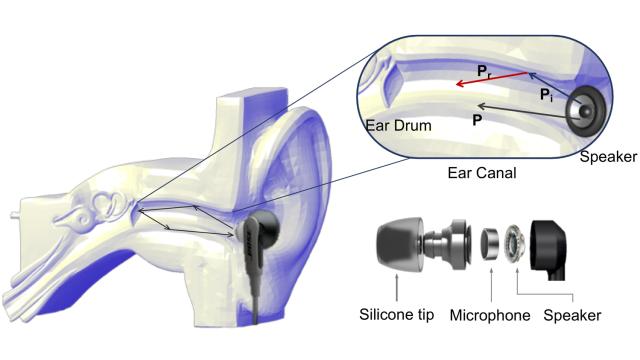Apple’s FaceID authentication system started moving smartphone users away from relying on fingerprints to secure their mobile devices, which are arguably less secure. But researchers think they’ve come up with an even better biometric tool for protecting a device that uses a part of the body that’s nearly impossible to spoof: a user’s ear canals.
A team of researchers led by Zhanpeng Jin, an associate professor in the Department of Computer Science and Engineering in the University of Buffalo’s School of Engineering and Applied Sciences, created a new authentication tool called EarEcho, which is somewhat self-explanatory.
The team modified a set of off the shelf earbuds with a tiny microphone that points inside the wearer’s ear, not out towards the world around them. It’s not there to pick up ambient sounds to facilitate a noise-cancelling or feature, or even the wearer’s voice for making calls; the tiny mic is instead tuned to listen to the echo of sounds as they’re played and then propagate through the ear canal.
Like fingerprints and faces (we’ll ignore twins for now) everyone’s ear canal is different, but unlike fingerprints and faces, you don’t unwittingly leave a copy of your biometric password behind when you pick up a glass or smile for a photo.
The ear canal is a private and protected space, and each one produces a unique signature based on how sounds echo or are absorbed inside it. That signature can be accurately detected by a microphone, and as these researchers discovered, it can be used to accurately identify individual people.
Twenty test subjects listened to different audio samples (like speech and music) in a variety of different environments, including noisy streets and shopping malls, and in various positions. The EarEcho system was able to authenticate the wearer around 95 per cent of the time given just one second of ear canal recording, and 97.5 per cent of the time when the recording was increased to three seconds.
As EarEcho is further developed and improved so will its accuracy, and the researchers have already filed a provisional patent application for the technology, so there’s a chance it might one day actually be available as an alternative to fingerprints and faces for securing your phone. However, there is one small issue the research team will have to overcome.
The system is dependent on the specially upgraded earbuds which include that extra microphone so when you lose your headphones, again, you might be locked out of your phone until you can find a replacement pair.
